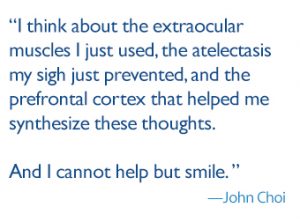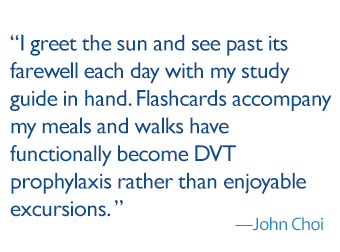I am sitting in one of the most beautiful architectural marvels I have ever seen: the iconic Rose Main Reading Room of the New York Public Library. A thoughtless turn of the head while stretching my neck and I catch a glimpse of centuries of knowledge in their primordial form — first edition journals and volumes neatly displayed in stacks of thousands. I could look up and be mesmerized by a scene that is reminiscent of a trip I once took to the Sistine Chapel in Rome, with a ceiling inlaid by golden frames sculpted around angels and flowers that adorn portraits of rose-colored clouds.
But I do not. I am instead studying for my boards and repetitively reading about Bacteroides fragilis and glycogen storage disorders. A headache builds as I enter my seventh hour of studying that day, and even then I wave the headache away as I try to recall the mechanism of how amitriptyline reduces chronic pain from tension headaches. My sandpaper eyes are forced to stay open as my ciliary muscles try to accommodate my struggle.
Indeed, studying is a struggle.
As medical students, we are no strangers to studying. To get into medical school, we must first do relatively well in undergraduate classes and receive an acceptable score on the Medical College Admission Test, or MCAT. Afterward, we continue to take exams during our preclinical and clinical years in medical school, with boards and licensing exams to follow for the rest of our careers. Indeed, between the time we enter medical school to when we emerge as attending physicians, we will have taken well over 30 exams. But my current adversary is considered one of the most important exams we take as future physicians. The first national board medical exam, Step 1, is the equivalent of the SAT to high school students. It is a strong determining factor for medical residencies and serves as one of two major quantitative measures of a candidate’s appeal — the other being clinical grades.
And so I study. I greet the sun and see past its farewell each day with my study guide in hand. Flashcards accompany my meals and walks have functionally become DVT prophylaxis rather than enjoyable excursions. I try my best to remain focused and keep what I learned three weeks ago from falling through the seemingly ever-expanding sieve that is my brain. But this is what I’m supposed to do. I’m supposed to study so I can take this test. But even as I repeat this mantra, something is off.
When I decided to come to medical school, I did so because of two broad reasons: I wanted to help others and I loved learning medicine. Just two years ago, I would gleefully read the latest articles on neuroscience or immunology in my spare time and marvel at the complexity of our bodies. I took joy in understanding how much there was to learn and loved the challenge of learning. In my mind, every opportunity to learn was a chance to become a better doctor. But while those patterns continued in medical school, my enthusiasm slowly began to temper as I found myself reading more out of obligation than enjoyment. And it was through this insidious slope that I found myself, here today in this beautiful library, woefully anticipating how much there is to still learn. Even as these thoughts continue to percolate, I remember there was once a time when I would have taken a brief pause after every new fact and whistled in appreciation.
So I stop.
I try to whistle, at least metaphorically.
 I crank my head up and force these tired eyes to appreciate this library. The ceiling is truly beautiful. I turn to the history engraved to my left. Colors of aged red, mysterious blue and forest green sharpen into focus. And then, as I slowly move my field of vision back to my books, I take a deep breath. I strive to look beyond bullet points of information and recapture some of the wonder I once had. I think about the extraocular muscles I just used, the atelectasis my sigh just prevented, and the prefrontal cortex that helped me synthesize these thoughts.
I crank my head up and force these tired eyes to appreciate this library. The ceiling is truly beautiful. I turn to the history engraved to my left. Colors of aged red, mysterious blue and forest green sharpen into focus. And then, as I slowly move my field of vision back to my books, I take a deep breath. I strive to look beyond bullet points of information and recapture some of the wonder I once had. I think about the extraocular muscles I just used, the atelectasis my sigh just prevented, and the prefrontal cortex that helped me synthesize these thoughts.
Studying will always be a part of medicine. The onus is on us for why we study. There are exams, of course, and these milestones can be as much a measure of our fatigue as they are of our professional progression. But we can choose to appreciate what we learn as a privilege. We can eagerly study in anticipation of being better physicians and scientists, all while marveling in the wonderment of it all.
All we need is a reminder to take a moment and look up.
Related Content
- 5 Tips for Preparing for your Ph.D. Candidacy Exam
- Taking your Step 1 exam? Novel Study Tools Redefine How We Learn

Great post! It's unfortunate that USMLE step 1 is given so much importance - a fault of lazy residency selection processes. not a fault of the student applicants. Exam scores are a better measure of test-taking ability than anything else, and are skewed by corrosive biases and chance (e.g. illness, other factors that can affect single-day performance).
It's true that continuous learning is a gift we shouldn't take for granted; I just wish it weren't driven so directly by exams. It is a joy to learn - particularly when motivated by the people for whom we are privileged to care.
Thank you for your comment Dr. Ray!
Indeed, my own interests in pedagogy often have me asking why we have such an emphasis on written tests. With that being said, I don't mean to marginalize all exams. I think that assessments--when constructed as a tool for learning rather than an end product--can be absolutely useful. For example, the practice exams for step 1 have helped me synthesize and sharpen my rudimentary clinical knowledge and recall. I do agree that learning shouldn't be driven so directly by exams. Quickly commenting on your last sentence, I appreciate your mindset and perspective from being a practicing physician; I certainly look forward to studying with real patients in mind in the near future.
Pingback: Stop and Smell the Pages
Comments are closed.